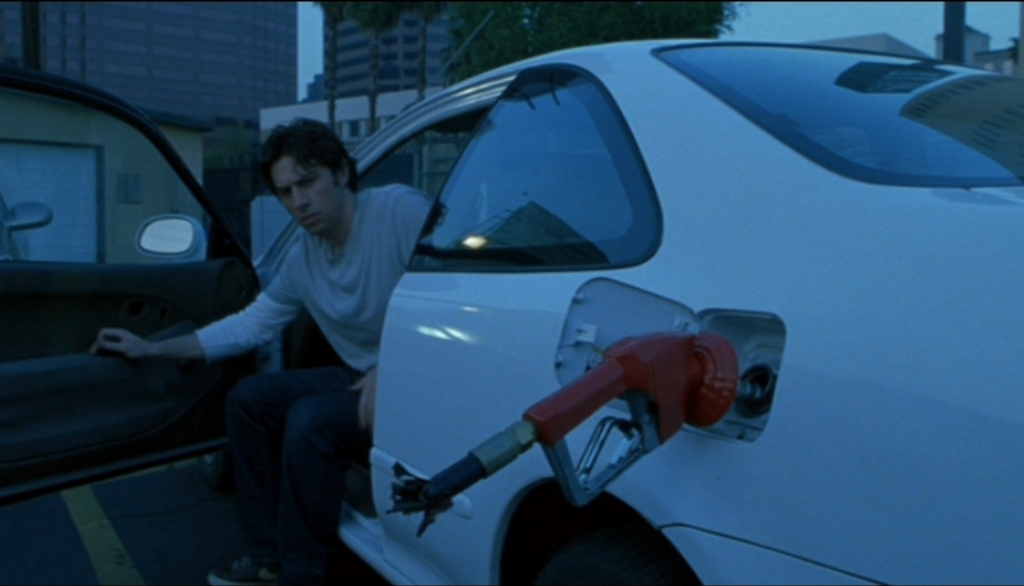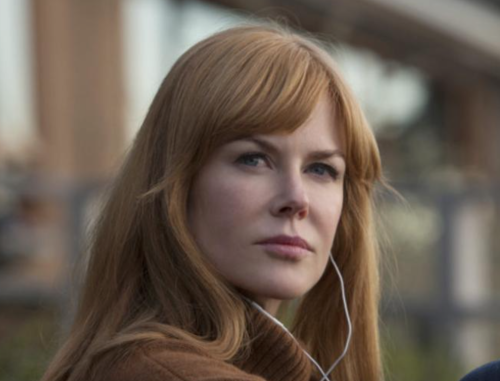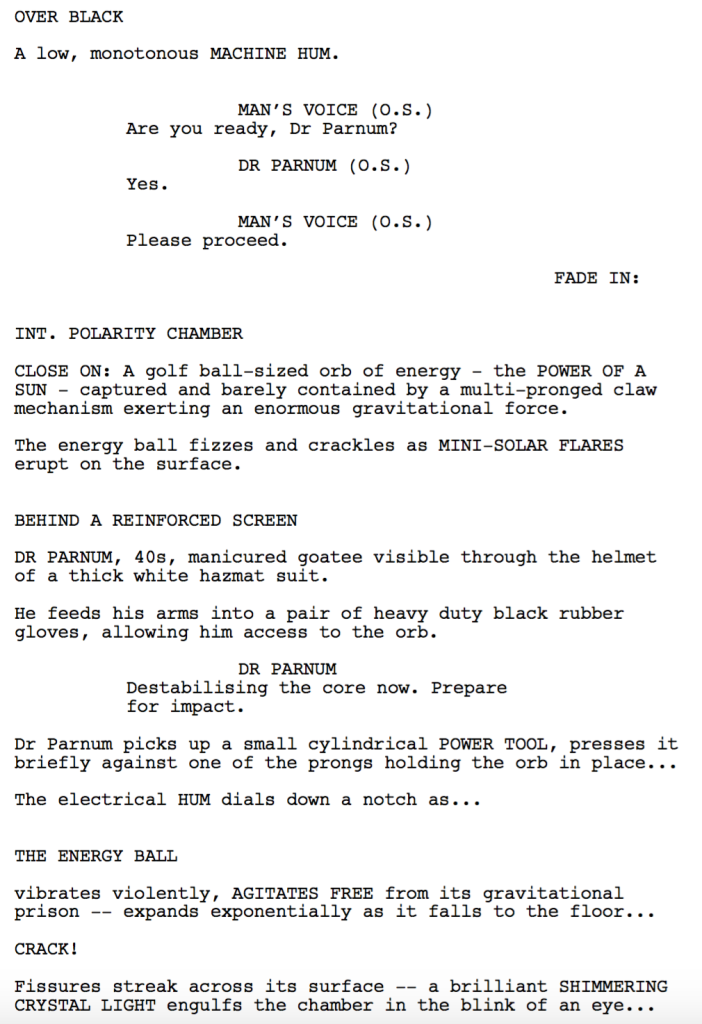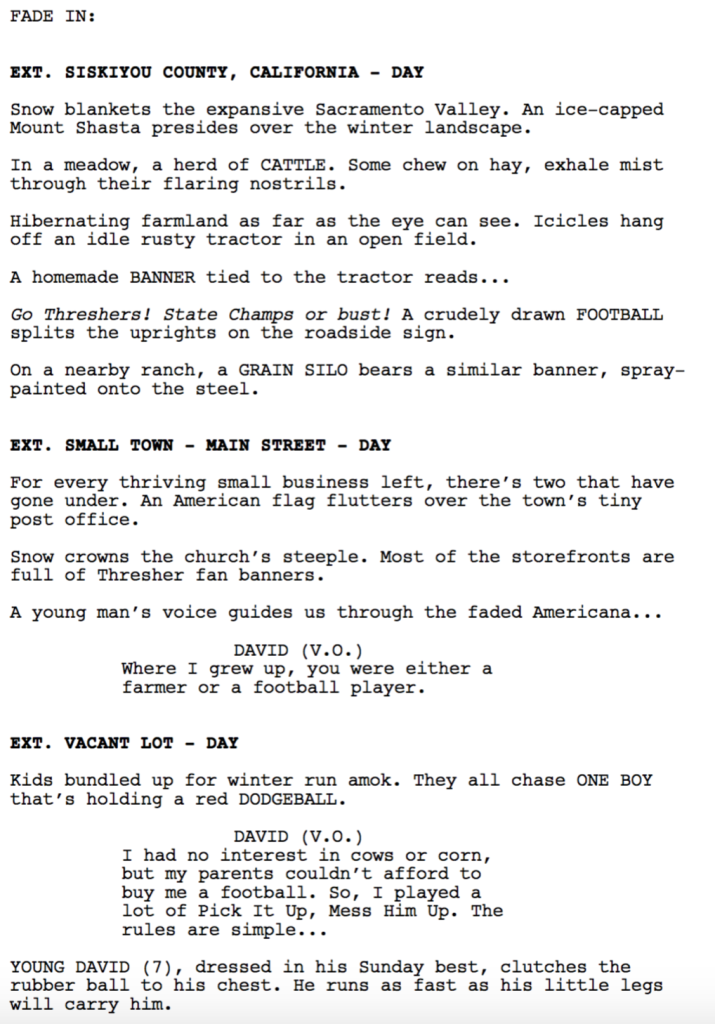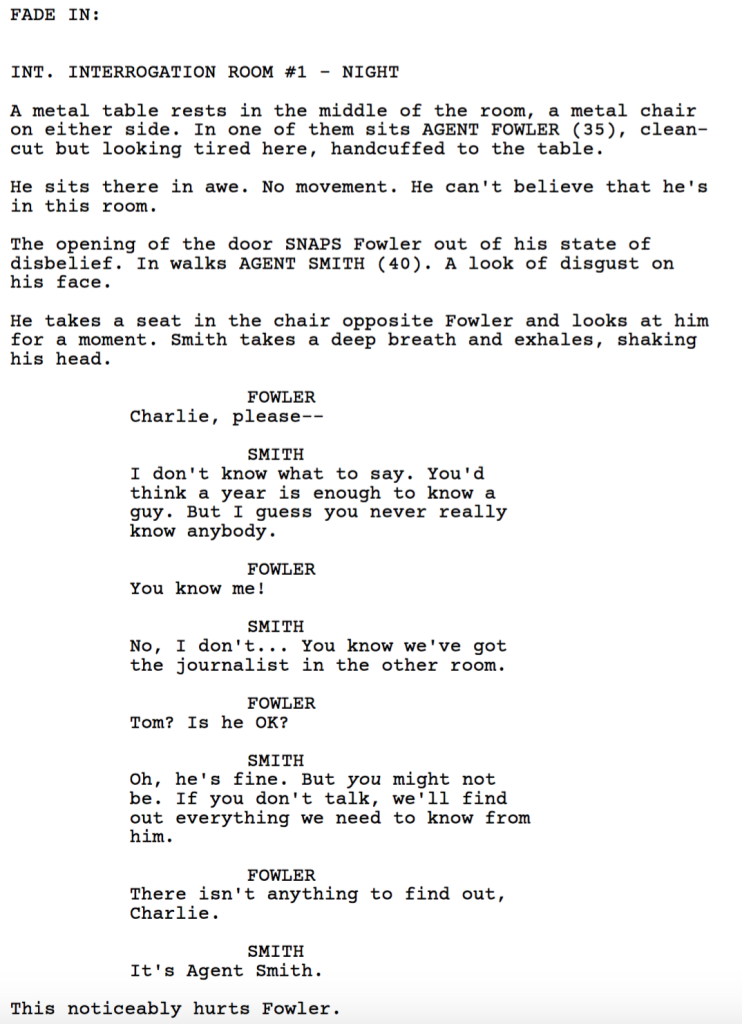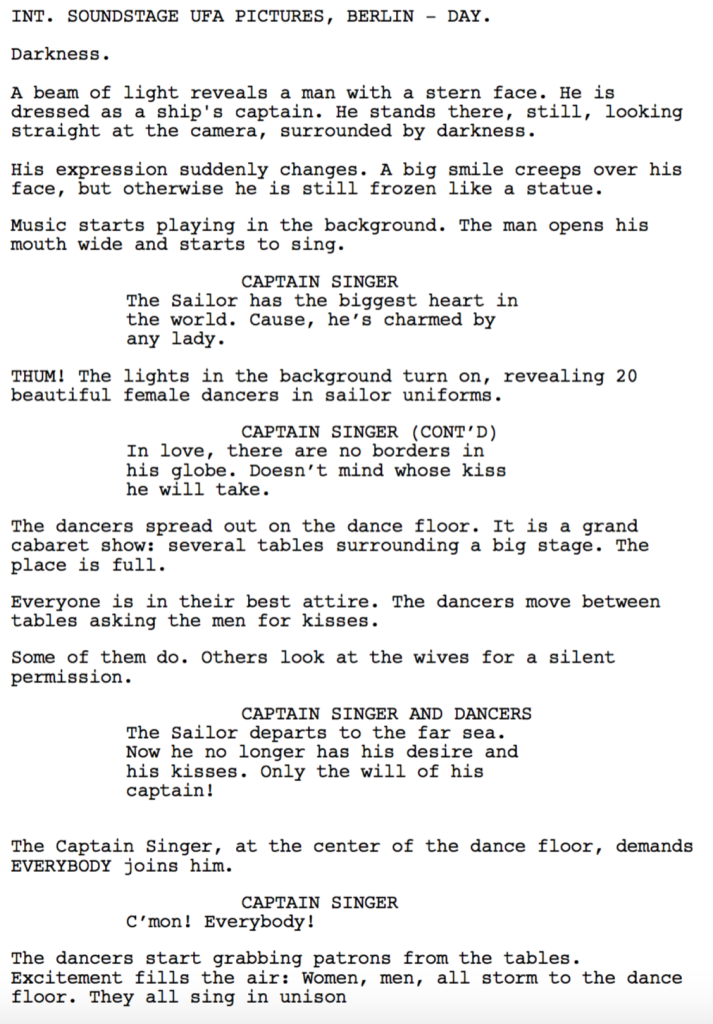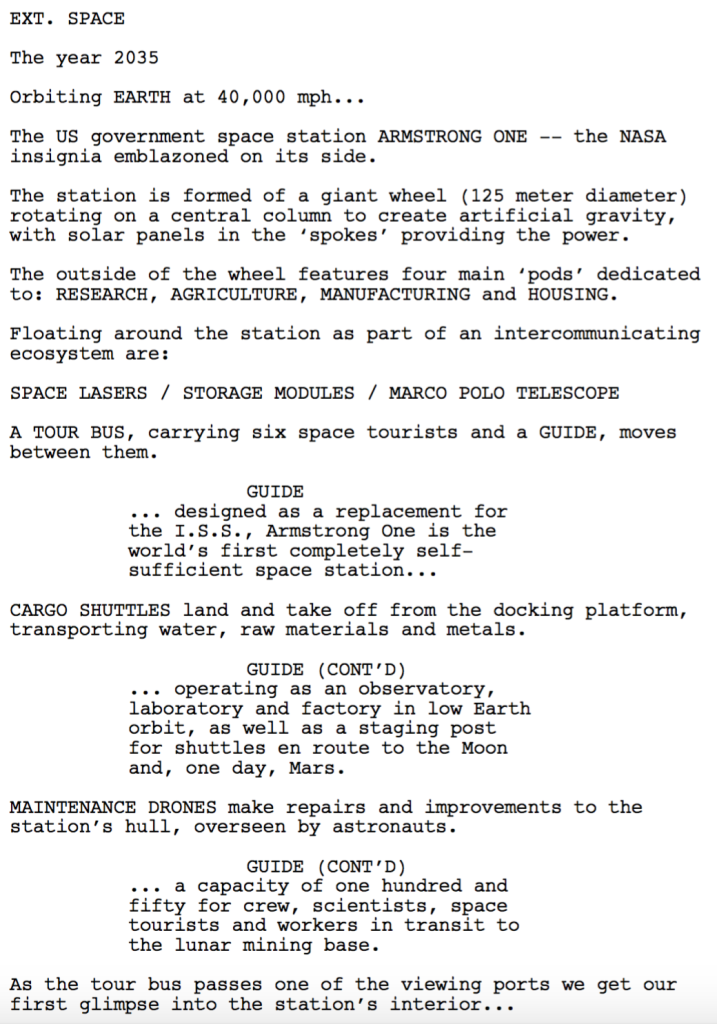What is anchoring and why is it important?
Let me start off by saying that anchoring is an advanced writing technique that beginners shouldn’t worry about yet. If you’re a beginner, worry about structure, keeping your descriptions succinct, getting your scenes down to a manageable length (under 2 and a half pages), not writing on-the-nose dialogue, arcing your characters. Anchoring is not going to help you if your fundamentals are so bad that your script is unreadable.
But once you’ve got all that down, anchoring can help you take your screenwriting to the next level. What is anchoring?
Anchoring is the process by which you anchor characters, plot points, story beats, and other story choices to REAL LIFE EXPERIENCE.
A common critique you hear a lot of writing teachers use is that there’s no “TRUTH” to a character (or to a moment). What they mean by this is that the character feels “written,” they don’t feel “true-to-life.” And that’s because, most likely, you completely made them up.
“But Carson, isn’t that the point of writing? To make stuff up?”
Yes and no. You want to make things up that give the reader a great reading experience. But that doesn’t work unless the reader BELIEVES what’s happening on the page. And to make them believe, your story must feel as real as possible (relative to the genre and movie type you’ve written).
This is where anchoring comes in. Let’s say you’re writing a comedy script. Your main character is the straight guy and you want to add a “zany best friend character.” If you construct that character completely out of thin air, he’s not going to work. He’ll feel made-up, cliche, thin, you name it. However, if you had, say, a crazy roommate in college, and you based your zany best friend on that roommate, now that character is going to carry a truth, a “realness” to him or her. Why? Because they’re based on a real person! This is anchoring.
Anchoring isn’t limited to character creation. Anchoring applies to any situation you write into your script. For example, if your characters have to go to a big company event, but you yourself have never been to a company event, you need to find a way to anchor that. Maybe you once attended a giant wedding. Weddings tend to have crossover with corporate events as both include a meal, socializing, music, drinking, etc.
What you’re looking for is specific stuff you can pull from the wedding to use at the company event. For example, maybe you remembered an annoying mariachi band that kept coming around and playing when no one wanted them to. Or maybe you ordered a drink at the bar only to learn that you had to pay for it. Maybe the planners messed up and didn’t include enough tables, forcing you to eat dinner while standing up.
Specificity sells realism and anchoring is a great way to add specificity.
I’ve discovered that there are five main levels to anchoring. Preferably, everything you anchor should be a level 1. But if that’s not available, you’ll have to go further down the list. Just know that for every level you go down, the less realistic your characters or situations will be. So proceed through these lower levels with caution.
LEVEL 1 ANCHORING – PERSONAL LIFE
This shouldn’t be surprising. Ideally, you’d like to anchor as much as you can to your own personal experiences. These are the things that will come off as the most truthful. People will read your stuff and give you compliments like, “It just all seemed so real.” That’s because it was real. A good example of this is Garden State. There was a scene in that movie where Zach’s character is about to get into his car the morning after a long night of partying and sees a ripped-off gas nozzle sticking out of the tank – you don’t just make that stuff up. That either happened to him or someone he knew. Which leads us nicely into Level 2.
LEVEL 2 ANCHORING – FRIENDS AND FAMILY
While not as good as anchoring something to your own life, anchoring stuff to your friends and family’s lives is the next best thing. If you want your hero to work in an office but you’ve never worked an office job in your life, anchor the job to your best friend who works at an office. You may not live their life, but you’re around them enough and heard about their experiences enough that you can craft a pretty solid approximation of the job. Likewise, if you need to write a sex addict into your script and have a friend who’s an alcoholic, you can anchor a lot of your character’s behaviors to your friend’s. That’s an important thing to note about anchoring. It doesn’t have to be exact. If you need to write a teenaged bully into your high school comedy, there’s no law that states you can’t anchor that bully to the Starbucks barista with an attitude you deal with every morning when you buy your coffee.
LEVEL 3 ANCHORING – SECOND HAND STORIES
We’re getting further away from the truth, which means you want to think twice about using this in your script. But occasionally you’ll hear friends, family members, or coworkers tell stories about someone they know or an experience they had, that was interesting in some way. Since you’re a writer, you’ll naturally want to include some of these moments in a screenplay. The problem is these stories are far enough away from personal experience that they contain a dream-like quality to them. They lack the specificity to make them believable. For example, I knew a guy through a friend who used to play on the professional tennis circuit. One night he told me this elaborate story about getting cheated by an umpire at the French Open. It was a great story. And I tried to anchor the essence of the story into a baseball script (with the home plate umpire committing the same sin on a player). But it never quite worked because I didn’t know all the details. I wasn’t there to smell the red clay, to endure the impatient booing of the crowd, to feel the pressure that, if I lost that match, I didn’t have enough money to get a plane back to the U.S. Second hand story anchoring can work. But it’s never going to feel as realistic as Level 1 or 2 anchoring.
LEVEL 4 ANCHORING – MOVIES AND TELEVISION SHOWS
This is where the majority of beginner and intermediate writers anchor their writing – to stuff they’ve seen. Need a villain? Hans from Die Hard worked. I’ll just create another version of him! Need a good chase scene? I loved that chase scene in Fast and the Furious 4. I’ll change the cars from Corvettes to Maseratis and nobody will be the wiser! This is literally the WORST thing you can do when you’re writing a script. It’s why so many amateur screenplays are so bad. The writers are just rewriting what someone else wrote. With that said, anchoring off of other movies can still work if you follow a couple of simple rules. Rule #1 is to twist whatever you’re cribbing enough so that nobody will be able to tie it back to the anchoring source. For example, if you made your “Hans” character a woman and had her use sexuality as a weapon, nobody’s going to be saying, “This is just like Hans from Die Hard!” Rule #2 is to favor movies that are old or unpopular. Quentin Tarantino built much of his career around this. Anchor characters and situations to barely-seen movies and nobody will call you out except for extreme cinephiles.
LEVEL 5 ANCHORING – YOUR IMAGINATION
If you try and craft a character strictly out of your imagination and don’t base them on anything or anyone you know or your friends and family know or who you’ve heard about second-hand or who you’ve seen in other movies, it’s 99.9999% likely that that character is going to feel written. For example, a flea-market furniture maker who fought in Vietnam before becoming a pacifist sounds like a really interesting character on paper. But if you’ve never been to a flea market and you don’t know anyone who’s sold self-made furniture or fought in a war or who’s a pacifist, it’s highly likely that character is going to read as total bullshit. BUT! Maybe you knew a hippy when you first moved to Los Angeles who made and sold jewelry on the Venice Beach strip and maybe your dad’s friend who used to come by for dinner twice a year fought in Vietnam and so if you could somehow combine those characters into one, there’s a shot at making that character work. That’s the power of anchoring.
A couple of final points I want to make. Where non-anchoring hurts you most is when you write a big character or include a big plotline that a lot of people are familiar with, but you know very little about. This makes for a lot of people who can call you on your shit. And they will. For example, if neither you nor anyone you know has kids to parent, yet your movie has a large parenting component, you’re going to get called on it. If you write a cop and the only thing you know about cops is what you’ve seen in movies – called on it. If a 60 year old who doesn’t even know what Instagram is tries to write a teenager – called on it.
When dealing with these issues, the solution may be to ditch the storyline or character you know so little about. Or re-write them into something you know well.
Finally, I’ll address something a lot of you are probably wondering. “What about if you’re writing in a completely imaginary world? Like Star Wars or Harry Potter?” When you’re writing inside of imaginary worlds, the big focus will be on anchoring characters. If they’re believable, everything surrounding them will be as well. For example, you may not know anyone who owns a floating city like Lando Calresian. So how do you write a character like that? Well, maybe you have this one uncle who showed up to every family reunion who was soooooo charming. Yet, if you talked to anyone behind closed doors, they told you he was involved in some shady shit. That’s how you create Lando Calresian. You base him on someone you know. And once we believe in that character, we’ll believe in that big floating city he runs.
I hope this is helpful. Feel free to share your own anchoring experiences in the comments section.
Carson does feature screenplay consultations, TV Pilot Consultations, and logline consultations. Logline consultations go for $25 a piece or 5 for $75. You get a 1-10 rating, a 200-word evaluation, and a rewrite of the logline. All logline consultations come with an 8 hour turnaround. If you’re interested in any sort of consultation package, e-mail Carsonreeves1@gmail.com with the subject line: CONSULTATION. Don’t start writing a script or sending a script out blind. Let Scriptshadow help you get it in shape first!
Genre: TV pilot (comedy)
Premise: A low-level hitman heads to LA for his latest job, only to inadvertently befriend his target, an aspiring actor.
About: Today’s script was written by SNL vet, Bill Hader, and Silicon Valley producer, Alec Berg. Whereas Netflix has embraced the “throw a bunch of shit at the wall and see what sticks” strategy, HBO still has to slot shows into a proper schedule, and is therefore more discerning about what they air. It’s for this reason that they still have the edge over Netflix. It’s also why, when something gets an official commitment from the network, you know it’s beaten out a ton of other quality material (last I heard, HBO had something like 100 projects in active development).
Writers: Alec Berg & Bill Hader
Details: 36 pages (Third Draft)
Since yesterday’s script was the antithesis of funny, I spent the last 24 hours on a comedy script hunt, a laugh-quest, if you will. After traversing many of Los Angeles’ landmarks – Randy’s Donuts, Rodeo Drive, the Capital Records building, I met a sinewy little fellow who called himself “Maurice Bubblestilskin the III.” “Psst,” he said to me, while I tried to hail a Lyft. “Psssssst!” he said again. And from under his cape, he passed me this, “Barry.” ‘Best project HBO’s got going for it,” he assured me, before slipping back into his tent and screaming at himself for 5 minutes. And that’s how I came across Barry.
Hitman-Comedy is a sub-genre with a lot of history behind it, and that’s because, like all good comedy, it’s built on top of some heavy irony – A comedy… about killing people. I’m surprised we don’t yet have the definitive hitman comedy. Could there be some flaw in the concept that keeps these scripts from being great? I’m sure we’ll find out. Grab my hand and hop in my Scriptshadow canoe while I paddle you through Barry’s plot.
Barry is lonely. But WAY worse than that, he lives in Cleveland. If there is a more hideous fate than being lonely in Cleveland, I don’t know what it is. The only time Barry has anything to do is when he’s on the job. Barry is a hitman, you see. He’s paid to kill people.
Barry has a Charlie’s Angel’s disembodied boss named Fuches who calls Barry whenever he’s got a job for him. And Fuches has a new target in Los Angeles. If Cleveland is our idea of hell, Los Angeles is Barry’s. Barry begrudgingly flies to LA, where he’s introduced to a medium-grade Chechen crime boss named Goran Pazer. Pazer is pissed because some trainer named Ryan Madison is fucking his wife.
Pazer has hired Barry because he can’t have his fingerprints on the murder. And it’s a fairly simple job. Ryan is a nobody trainer. So, theoretically, all Barry has to do is wait until he gets home and put a bullet in his head. But Barry makes the mistake of following Ryan to an acting class (yup, it’s LA, so Ryan is also an actor!). And after being lured into the class by a beautiful young actress, Barry bumps into Ryan, who assumes he’s a fellow actor, and asks Barry to do a scene with him.
Barry does the scene with Ryan, likes it, and is then pulled out for drinks with the acting class. Being such a lonely guy, this is an exhilarating experience for Barry. But now he has a dilemma. He has to decide if he’s going to kill his new buddy, Ryan, or wiggle out of his contract and pursue his new dream – ACTING! Unfortunately, Barry’s hand is forced when the Chechens step in and take care of Ryan on their own. The plan is to kill Barry next, but Barry kills them first. And that’s how Barry finds himself an aspiring actor in LA… with the Chechen mob after him.
I want to take this opportunity to reiterate a great screenwriting device that works every time you do it. It’s mostly a comedy thing but you can use it in any genre. It’s called the “Mid-Scene Twist,” and the structure behind it is quite simple. You make the audience believe the scene is one way. Then, at the midpoint, you reveal that it’s something completely different.
We open on Barry, washing up in his bathroom, getting ready for the day. He looks at himself in one of those, “What the hell am I doing with my life?” ways. He plucks a gray hair, frowns, straightens up, then walks out. As he walks through his apartment, we notice… GUN HOLES IN THE WINDOW? Oh, and then there’s a murdered dude on the floor. This isn’t Barry’s apartment. No, Barry is a hitman, and he’s just finished a job.
In this case, the mid-scene twist was subtle. But it’s a lot more interesting than say, showing the hit. We’ve seen hits before. Hell, I think every single movie in history has a hit. So to start with a mid-scene twist was a much stronger choice.
A more aggressive form of the Mid-Scene Twist came at the beginning of an, unfortunately, terrible movie – Snatched (that Amy Schumer Goldie Hawn jungle flick). But it was a good scene!
In it, Amy’s character is at a clothing store, picking up dresses to try on, excitedly telling the employee helping her about the amazing vacation she’s about to go on with her fiancee. The employee seems a bit overwhelmed as Amy continues to grab new articles of clothing and gab away.
Finally, when the employee can get a word in edgewise, she says, “So are you going to set me up with a fitting room?” And we realize that it’s actually AMY who is the employee, and the other girl the customer. Amy then becomes defensive, frustrated that this woman isn’t appreciating her upcoming vacation, and the two eventually go their separate ways. It’s a simple premise, the mid-scene twist, but very effective when done well.
Start us off one way. Twist it into something else. Usually the opposite of what we assumed.
As for the rest of Barry, it was good. It was a little different. More importantly, it was unexpected. And this is where all the amateur writers screw it up. Because I know the amateur version of this script. I’ve read it a million times. Barry has to kill a guy. He goes over to the house. But, oh no, ZOINKS, the guy shows up with the wife he’s fucking! And the only place for Barry to hide is… ZOINKS!… UNDER THE BED! So he has to hide under the bed while the two have sex! Oh the shenanigans! Oh how the hilarity is ensuing!
No.
NO NO NONO ONONONOONNOONONOON
If you write that version of the script, you are a failure as a writer. I’m not kidding. Your job as a screenwriter IS TO GIVE US THE UNEXPECTED. If you give us what we expect, why would anyone pay you? If they want the version everyone expects, they write it themselves. They pay you to come up with unexpected complications and obstacles that keep the story fresh.
And that’s exactly what happens here. I never thought in a million years that Barry would get drawn into an acting class, and start to like acting, and start to like a girl in class, and wonder if he wants to move to LA, and kill the guys who hired him instead of the guy he was supposed to kill. I didn’t expect any of that. And so, even if I don’t like what the writer did with the story, I acknowledge that he gave me something unique.
Now, as it so happens, I did like what the writers did here. My only issue is with “Barry” is Barry himself. He’s such a quiet character. Quiet characters are hard to make interesting. And to build an entire show around a quiet character is more challenging than they may be anticipating. But I was still intrigued by what Barry would do next. That’s a sign that I’m connecting with the character.
We’ll see what happens once this hits the air. Im predicting, at the very least, a multiple-season pick-up.
[ ] What the hell did I just read?
[ ] wasn’t for me
[x] worth the read
[ ] impressive
[ ] genius
What I learned: When writing TV shows, think about character advancement. Where are they in their career now and is there opportunity for them to move up over time? Because that’s where you’re going to find your Season 2, Season 3, Season 4, is in the character advancing in their career. Breaking Bad is the most obvious example of this. He’s a small time drug dealer at the beginning. Then, by the end, he becomes a major force in the meth business. Here, Barry is a low-level hitman. So there’s lots of room for him to move up the ladder.
Genre: Family Comedy
Premise: The former lead singer for an Alt-Rock band must take his kids on the road with him when the band reunites for one of the biggest music festivals in the world.
About: Mega-writer Drew Pearce (Iron Man 3, Sherlock Holmes 3) teamed up with Jason Segal (The Muppets, Sex Tape) to sell this pitch for north of a million dollars a few years back. The scribes then went to work, but nothing ever came of the project. Today, we’re going to find out why!
Writers: Drew Pearce & Jason Segel (loosely based on the doc, “The Other F Word”)
Details: 106 pages (5/6/14 draft)
The aging rock star concept is one I see a lot. I think it’s because the rock star is the quintessential embodiment of Peter Pan syndrome. People enjoy the irony of seeing an aging rock star forced to grow up. But it’s also a sub-genre that’s never quite been nailed.
Are Drew Pearce and Jason Segel the writers to finally nail it?
Jim Stent is 35 and father to 14 year-old Tara and 8 year-old David. To people who grew up with normal lives, getting to be a dad to two wonderful kids might be the pinnacle of their lives. But Jimbo used to be a rock star! Well, that’s putting it strongly. But he was the lead singer of a fairly well-known alt-rock band in the 90s called Delinquents (no “The!”). And once you’ve had thousands of fans screaming your name, you’re not exactly pining to pack lunches on Monday morning.
To add insult to injury, Jim’s wife, Suzanne, is becoming the next Stephanie Meyer. Her werewolf books have gotten so popular that when you google Jim Stent’s name, his band doesn’t even come up anymore. He gets, “Suzanne Stent’s husband” instead! Jim is feeling more irrelevant every second.
So when his old guitarist, Richard, stops by and says that the 6th biggest rock fest in the world wants Delinquents to reunite, Jim is intrigued. But with Suzanne about to go on a book promotion tour, Jim’s stuck on daddy duty! That’s when Jim comes up with a plan. He’ll tell Suzanne that he and the kids are going on a camping trip instead, then go on tour.
Jim and Richard get the rest of the band back together (crazy Gene Biscuits, and mute bassist, and the lone female in the band, Blue). The plan is to play four small venues so they’ll be ready for the festival. Off on tour they go. But with kids!
The mini-tour is an ongoing balancing act as Jim tries to protect his kids from the unseemly aspects of rock glory. But in doing so, is unable to channel his inner rock star, leaving his performances devoid of energy and coolness.
Gene Biscuits finally has to step in, telling Jim that he’s become a lame dad. And that if Delinquents return is going to be successful, he’s going to have to leave the “dad” behind and let loose! But therein lies the question. Can Jim leave the dad behind? Or is that who he’s become?
Whoa.
I mean.
Whoa.
I’ll be honest. I don’t like this genre. Personally, I think family comedy is where screenwriters go to die, the last leg of the tour, if you will. But there’s a way to make these movies work. It’s not like by deciding you’re writing a family comedy, the movie will automatically suck. School of Rock was a family comedy and it was good.
Here’s my operating thesis on what went wrong here. Family comedy works best when you define the line of what’s “too far” for a family comedy and you spend the entire script going right up to that line, even inching past it. Because that’s what makes people laugh. They don’t laugh at the safe obvious stuff. They laugh at stuff that’s gone a little too far, the stuff they’re not sure they’re allowed to laugh at.
School of Rock is actually a good example of this. Jack Black’s character perfectly walked that line of liking the kids but also making fun of them when a good joke presented itself.
Delinquents never gets anywhere CLOSE to that line.
The main joke in the movie is Jim rewriting “kid-safe” swear words that all of the band must use. You can’t say, “Motherfucker.” You must say, “Motherfrogger.” There might have been a version of this joke that was funny if the substitutions were funny. But they were all lame. And, jesus, swear jokes have been beaten to death in this genre. As far as I’m concerned, you get one “EARMUFFS!” zoinks swear joke in a family comedy and that’s it. Go challenge yourself and find some new jokes.
The rest of the script is similarly lazy.
A few weeks ago, we talked about the power of saying “no” to your characters. The more you say “no” to them, the more they’re forced to fight for what they want. And that’s the most entertaining thing about watching a movie – seeing your hero work hard to get what he wants.
But I want to talk about a bad type of “no.” The “fake no.” The “fake no” is when you say “no” to your character when it doesn’t make sense. The only reason you’re doing it is because Scriptshadow told you to. So in the first few pages, we establish that Jim is miserable and misses his former life as a rock star.
Then Richard shows up and says, “Hey, do you want to get the band back together?” Now, in real life, what does Jim say here? He says yes! This is exactly what he’s been waiting for! But because they needed conflict, they had Jim say no for NO OTHER REASON than this was a screenplay.
This leads to a big scene where the families get together for dinner and Jim “feels out” what people think about a reunion, the idea being that if it’s a positive reaction, he might be up for it. But the scene is lifeless because the device that got us here (the “fake no”) was so transparent.
And while the average viewer isn’t going to understand any of the terms I’m using above. Believe me. They subconsciously know when something’s off. You can’t bullshit audiences. They’re smarter than you think.
This script just needed to be more dangerous. It needed to take more chances. And I’ll give you an example of one of the first chances they should’ve taken.
The script starts in the present, with us getting to know Jim, the lead singer, and Richard, the lead guitarist. We also meet Suzanne, Jim’s wife. We then learn that the reason the band died was because Jim got Suzanne pregnant 15 years ago. He had no choice but to quit. He had to start a family.
Quickly after this present-day setup, we flash back to 15 years ago, when the band was on top of the world. Backstage, after a big concert, a 20 year old Suzanne walks into the room. She walks right up to Jim and gives him a big kiss. A few minutes later, she reveals that she’s pregnant, and we cut back to the present.
First of all, we didn’t need this scene. This was exposition that was already hinted at and could’ve easily been handled inside of one present-day line of dialogue.
Regardless of that, one of your jobs as a writer is to do the unexpected. Seeing a man with a wife in the present and then cutting back 15 years and showing the two of them together again – what’s the point of that? If you’re going to flash back, you need to give us NEW INFORMATION.
What they SHOULD’VE done is have Suzanne walk into the room, look like she’s going to walk up to Jim, but she walks right past him and gives a kiss to… Richard. It’s there we learn that Suzanne used to be Richard’s girlfriend. We would eventually learn that she was sleeping with Jim while she was with Richard, and that’s the reason the band broke up.
Now, not only does that scene have a reason to exist. But you have some MAJOR CONFLICT to settle in the present-day storyline, and you build that darker edgier comedy out of that conflict, instead of going to the kid’s swear-joke well.
I’m probably being hard on this because I really don’t like family comedy. But I still think this could’ve been a lot better.
[ ] What the hell did I just read?
[x] wasn’t for me
[ ] worth the read
[ ] impressive
[ ] genius
What I learned: Don’t say “no” to your characters just because a screenwriting website told you to. Every “no” you insert should be believably motivated by the characters and the situation.
Genre: Drama
Premise: A divorced mother must protect her drug-addicted daughter after she does something horrible to her abusive boyfriend.
About: This script was purchased by Black Bicycle Entertainment, who will produce with Scott Free (Ridley Scott). This team is also producing another Ingelsby script, The Burning Woman, which stars Anne Hathaway. Ingelsby is probably best known as the guy who was selling insurance in Pennsylvania when his spec script, “The Low Dweller” (Out of the Furnace), sold to Leonardo Dicaprio’s company for a million bucks.
Writer: Brad Ingelsby
Details: 115 pages
We are in the dark weeks of movie entertainment, my scribe-friends. It’s the end of summer, where studios dump tweener content they’re unsure of into the market and hope they catch fire. The Hitman’s Bodyguard? That concept is straight out of 2005. And what is, exactly, the genre for Logan Lucky? Comeheistindy?
Did you know that two weekends from now, there will not be A SINGLE NEW STUDIO WIDE RELEASE? You heard me correctly. ZERO! That hasn’t happened in 20 years. Now I’m not ready to say the sky is falling. We still have IT coming up and Star Wars, and the Oscar hopefuls will begin rolling out in the fall. But it sucks that there’s nothing out there to watch.
It’d be cool if they could give Good Time a wide release, my favorite movie of the year. But the truth is, those kinds of movies can’t survive in the Streaming Generation. If a film looks like it has the production value of a movie you’d watch on Netflix, people aren’t going to pay money to see it in the theater.
And that’s too bad. Because if this were 1997, Good Time would’ve made 60-80 million dollars and everyone would’ve been announcing the film as a breakout hit.
Which brings us to “Claire,” another good script that, unfortunately, also suffers from tweener status. It’s not a horror film. Not a comedy. It’s definitely not a super-hero movie. It’s not fast-paced enough to be a thriller. So the only way a movie like this escapes a 4 theater release is if David Fincher or Clint Eastwood signs on.
Is that possible? Sure. But so is winning the lottery.
Kate Garrett is in her 40s and, at first glance, seems to be living the life. She has a huge mansion that rests on 22 acres. She’s got horses, guest houses. Money seems to be an afterthought in Kate’s universe.
But as details emerge, we realize this utopia isn’t all it’s advertised to be. Kate’s divorced. The man she married was extremely rich, but he’s long gone, upgraded to a new family. So Kate spends most of her days wandering about the scenic acreage, coming up with things to do.
It isn’t long before we learn what Kate’s real job is: Claire. Claire is Kate’s 20 year old opiate-addicted daughter. We’re not talking casual addiction here, folks. Claire goes off for days at a time with her abusive boyfriend, Ryan, and rides the devil’s coat tails.
To make matters worse, Kate’s as addicted to enabling as Claire is to opiates. Whenever Claire comes home with puppy-dog eyes and a laundry list of apologies, Kate happily lets her in, nurses her back to health, only to be taken advantage of by Claire again, who takes her money, jewelry, anything that pays for the next high.
The first half of the script explores Kate’s loneliness in this giant house, and how that loneliness drives her enabling. Those little slices of daughter-love are the only thing worth living for.
But (spoiler) when her daughter gets in a fight with Ryan and accidentally kills him, Kate is forced to perform the ultimate enabling act – clean up and erase all traces of the murder. Kate achieves this. But just when we think the coast is clear, Kate’s own hidden addiction surfaces, which begins a chain reaction that forces Kate deep into the dark world Claire inhabited for so long.
There are two kinds of people in this world. Those who can’t watch Intervention. And those who can. Intervention is a docu-series where people get help for their addicted family members, usually daughters, sons, or spouses. I wouldn’t say there’s anything entertaining about the episodes. But there’s a weird high that comes from watching people battle their addictions.
On the one hand, you’re furious with them. They make their loved ones’ lives a living hell, then take advantage of that love to keep paying for their addiction. On the other, you want to see them get better, so you’re hoping they’ll be one of the few to somehow kick the habit.
If watching that play out is your jam, you’re going to love Claire. Cause this is the closest a feature script has come to mimicking the realism that is Intervention.
I loved the way this script started. It’s called “Claire.” But we start on someone named Kate. We get to know all about this Kate but, obviously, we’re wondering, “Who the hell is Claire???” It’s rare you find a writer clever enough to use their title as a form of suspense.
That’s basically all writing is, finding little tricks to keep the reader around, dangling a carrot in front of them if you will. And when that carrot has been reached, you better have another one dangling, or else why would they keep walking?
Once we find out who Claire is, the next carrot is the Intervention device – our simultaneous intrigue and anger with Claire. One second we’re happy that she and her mom are hanging out, having fun. The next we’re furious because she’s stealing Kate’s money and taunting her while she does it, anything to get that next batch of pills.
Ingelsby’s biggest strength is that there’s such a level of detail to his characters and the broken lives they lead that you believe it all. This is one of the hardest to do in writing which is why so many writers fail at it. They think to convince an audience that a character is a drug addict, you show that character stick a needle in their arm and fall back against a wall in ecstasy.
Not how it works, people. Want to know how I know that. Because “Claire” is one of the most realistic depictions of addiction I’ve read and we don’t see Claire get high once. We see her WHEN she’s high. But we never see her take drugs.
On Thursday, I’m going to talk about how to create this realism. It’s called “anchoring.” Anchoring is the process by which you anchor components of your story to components of your own life. It’s really the only way to build truly believable situations. And there’s no doubt in my mind that Ingelsby used it here. These scenes are so raw, so detailed, they have to be anchored in truth.
Another thing I like about Ingelsby is that he’s elegant and he’s thorough. For starters, this man cares about details. He knows that specificity sells realism. But he also thinks about the best way to convey that realism. He’s not boring about it. For example, when Kate goes over to her ex-husband’s house, she runs into Audrey, her ex’s new wife.
Inglesby writes a line which I felt perfectly captured how the new wife sees the old one. This is what he wrote: “Audrey regards Kate with a smile, polite but not friendly: Kate is an annoyance that must be tolerated.” That line gives me everything I need to know about that relationship in less than two seconds. That’s good writing.
If you’re someone who struggles with character development, this is a great script for you to read. We have everything from vices, to flaws, to backstory, to complicated relationships. It runs the gamut. So check this out if you can. And feel free to let me know what you think!
[ ] What the hell did I just read?
[ ] wasn’t for me
[xx] worth the read
[ ] impressive
[ ] genius
What I learned: Avoid anchoring characters to your imagination. Instead, anchor your characters to people you’ve known in your life. I promise you those characters will come off more realistic (MORE ON ANCHORING THURSDAY!).
There are no movies coming out this weekend. You know it to be true. Which means one thing. IT’S TIME TO READ SOME SCRIPTS! Will we find the next Das Chimp out of this weekend’s entries? Or the next Orbital (that’s an old-school Scriptshadow joke there)?
How to play: Read as much of each script as you can and submit your winning vote in the comments section. Winner gets a script review next Friday!
If you’d like to submit your own script to compete on Amateur Offerings, send a PDF of your script to carsonreeves3@gmail.com with the title, genre, logline, and why you think your script should get a shot. Good luck!
Title: Radiant City
Genre: Sci-fi
Logline: In a post-apocalyptic city where people have gained the ability to cast ‘echoes’ – temporary copies of themselves – an Echo Crime Detective hunts a killer with the unprecedented ability to echo other people.
Why You Should Read: Radiant City is a noir-tinged sci-fi thriller with inventive set pieces, a racing plot, and a super strong protagonist that will have A-listers clamouring to get their agents on the phone. Well, that’s the dream anyway! Read a word, a page, or the whole thing – all candid feedback is welcome, you lovely people.
Title: THE COMEBACK
Genre: Drama
Logline: An inspiring story based on true events about an all-star high school quarterback that loses his throwing arm, but is determined to return to the game he loves with the help of a retired NFL physical trainer.
Why You Should Read: The script’s inspired by the true story of a one-armed high school quarterback from Seattle. I was so blown away by the kid’s determination, I wrote this tale that’s told in the vein of Soul Surfer and Rudy. Per Carson’s lesson, I said No to my protag as much as I could on his difficult quest of rehabilitation and redemption.
Title: Ridgeville
Genre: Crime Drama
Logline: After the elusive serial killer known as “The Exterminator” is apprehended under mysterious circumstances, an FBI Agent and a local journalist team up to find the real killer.
Why You Should Read: My name is David Fershtadt, and I am going to be a freshman in college this year. When I was in eighth grade, I sprained my ankle during basketball practice. At the time, I wasn’t that big of a movie fan. However, since I couldn’t walk for a few days, I decided to watch some movies. I went to the IMDb top 250 and picked some that I liked. Ever since, I have been a huge movie fan. Since I also love to write, I figured I should try to write a screenplay. I started writing Ridgeville two years ago, but gave up soon after. Recently, since it was the second semester of senior year, I had time to look at what I wrote, see what I could fix, and power through. Now, I have a finished feature length screenplay. I think you should read my script because I believe that it is compelling enough to keep your attention throughout. It will have you asking questions from the start and make you want to find the answers. I also want to be able to get feedback that will help me become a better writer, and I believe you can provide me with that. Thank you so much for your consideration!
Title: The King’s Fool
Genre: Historical/Drama
Logline: During World War 2, a famous Jewish director was coerced by the Nazis to produce a propaganda film showing the concentration camps as a spa for Jews, all while being a prisoner in one. Based on the true story of Kurt Gerron.
Why You Should Read: For the past seven years, I’ve been writing, directing and producing my own short films. Since my love for making movies is bigger than my wallet, I almost went bankrupt because of it. With that said, a year ago I wrote this screenplay after a FULL YEAR of research. The story is full of irony, and I never understood why no one had made a movie about Kurt yet.
Title: Genesis Protocol
Genre: Sci-fi / disaster
Logline: The year 2035. With Earth facing imminent destruction, a government space station — with capacity for only 150 people — becomes the last refuge for what will remain of the human race.
Why You Should Read: I’ve now written over a dozen screenplays but nothing prepared me for a story of this magnitude and complexity. For the first time ever I took on a writing partner — an engineer / scientist specialising in the design of space habitats — to make the script as accurate and authentic as possible. It has been a fantastic experience (for me at least, I can’t speak for him!) and we now have various other ideas brewing including a graphic novel. I hope you guys enjoy the script and thank you in advance for any feedback.


